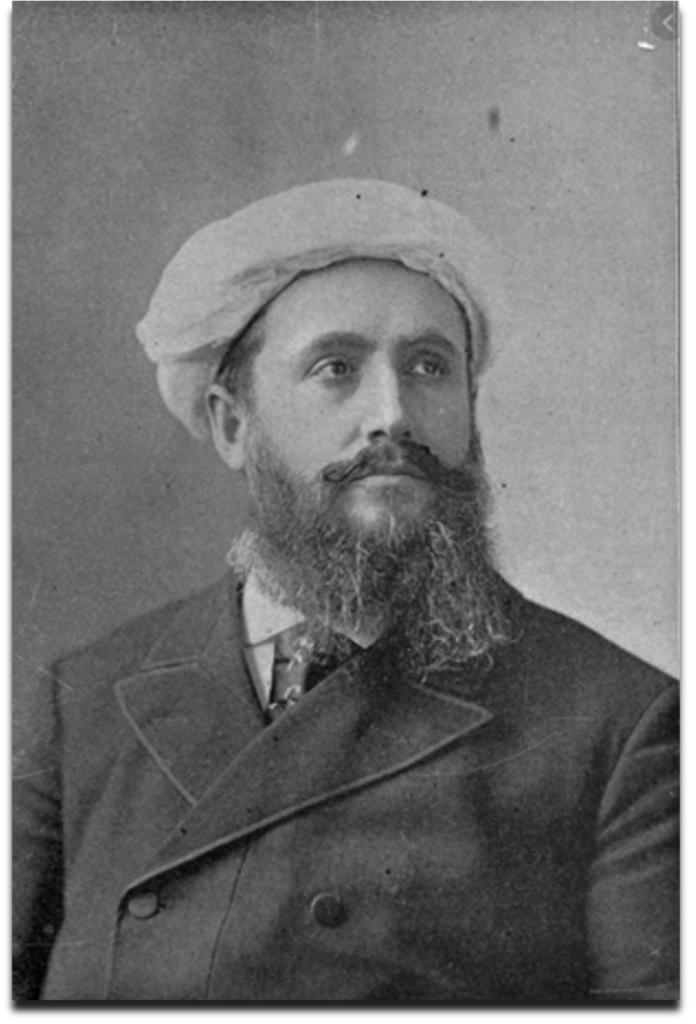
Alexander Russell Webb belonged to a well-established upstate New York family. He was the second child of Alexander Nelson Webb and Caroline Elizabeth Lefferts, born in Hudson, Columbia, New York, on 9th November 1846. His father Nelson Webb was a leading journalist of his time who was hired as a printer for the Columbia Washingtonian, a local newspaper in 1844, he purchased the Washingtonian from Warren Rockwell and continued its publication while also founding Hudson Daily Star, the first daily newspaper in the county.[1]
Webb’s religious life as a child was spent in obedience of his parent’s association with the Orthodox Presbyterian Church. He did not feel connected to the church from his early days but could not avoid it. It was at the age of twenty he says that he became his own master and due to the mere frustration, he wandered away from it for about nine years. He writes:
“As a boy I found nothing in orthodox Christianity calculated to win me to it, and in later years I encountered convincing evidences of its grave errors and insufficiency as a means of securing salvation, or of elevating and purifying the human character. Fortunately, I was of an inquiring turn of mind I wanted a reason for everything, and I found that neither laymen nor clergy could give me any rational explanation of their faith, but either told me that such things were mysteries or that they were beyond my comprehension.”[2]
After a vain search in the Christian system to satisfy his longing, he drifted away in materialism for several years having no faith. Webb’s career varied as he began working in a jewellery store to editing a local newspaper when he moved to Unionville Missouri in Jan 1874. Webb became politically active by joining various political clubs and associations which also didn’t last long and after years of instability and wanderlust he embarked on a religious quest and became interested in the oriental religions in early 1884.[3] Webb had access to a library of about 13,000 books[4], he began with Buddhism and ultimately joined the Theosophical Society. Umar F. Abd-allah talking of Buddhism and its link to Theosophy writes:
“Buddhism and Theosophy were integrally linked during the late nineteenth century, and it is not surprising that Webb’s interest in Buddhism would ultimately tie into Theosophy.”[5]
The Theosophical Society
The Theosophical Society was founded by Q. Judge, S. Olcott and Helena P. Blavatsky in 1875 in New York as a means to study comparative religion with emphasis on Buddhism and the Eastern faiths and exploring their esoteric traditions.[6] After a few years Olcott and Blavatsky decided to move its headquarters to India and established the International Headquarters at Adyar, in Madras. Jeffrey D. Lavoie explains in her book The Theosophical Society: The History of a Spiritualist Movement that the Theosophical Society was in fact an outgrowth of spiritualist movement despite the Theosophical Society’s implying that they were a separate organisation. The author believes that the Theosophist philosophy and belief systems remained harmonious with Spiritualism.
She writes: “The Theosophical Society was founded by a group of spiritualist in the nineteenth century who were interested in the investigation of paranormal activity including spirit channelling, table levitation and the appearance of spirits in the human form (Materializations)…Historically there are all varying types of Spiritualist groups including Christian orthodox and progressive agnostic beliefs; however, all of these seem to agree on one overriding philosophical tenet-‘ That departed spirits of the recently deceased can communicate with the living through human beings known as mediums- this belief is the main principle that unites all Spiritualist”[7]
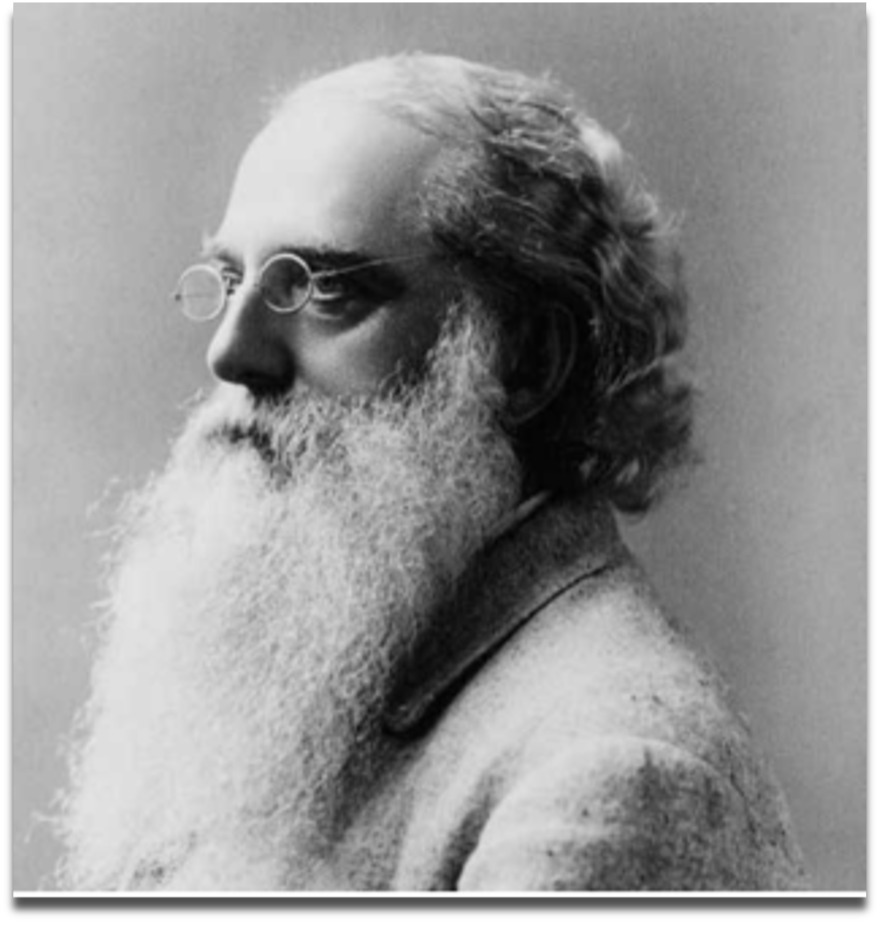
Henry Steel Olcott one of the founding members of the Theosophical Society and its first president until his death in 1907, received the two circulars from the Promised Messiahas regarding his book Braheen-e-Ahamdiyya and his claim to be the Reformer of the Age which Olcott reprinted in the September issue of his journal The Theosophist in 1886. The Promised Messiahas in these circulars explained that his book Braheen-e-Ahamdiyya elaborates upon the divine origin of the Holy Quran and truthfulness of the Holy Prophet Muhammad (may peace and blessings of Allah be upon him). It demonstrates the superiority of Islam over all other faiths with logical arguments. The Promised Messiahas offered 10,000 rupees to anyone who would prove the augments brought forward therein to be false. All were invited to stay at Qadian at the expense of the Promised Messiahas.
The Promised Messiahas wrote: “Now, if you do not come you will yourself be answerable to God. After awaiting your arrival for three months, the statement of your indifference will, ipso facto, be noted in the book as stated above, but in case you do come, and fail to behold any heavenly signs during your stay with me for the time specified, you shall be paid Rs. 200 per mensem (besides food and accommodation, which will be supplied free to all) as compensation to cover your damages, or as a recovery of fine in default of my promise. If you deem this sum inadequate to your dignity, I am even ready to pay as damages or fine for unfulfilling promise, whatever suitable sum you propose yourself, proportionate to your rank, if it be but not beyond my means.”[8]
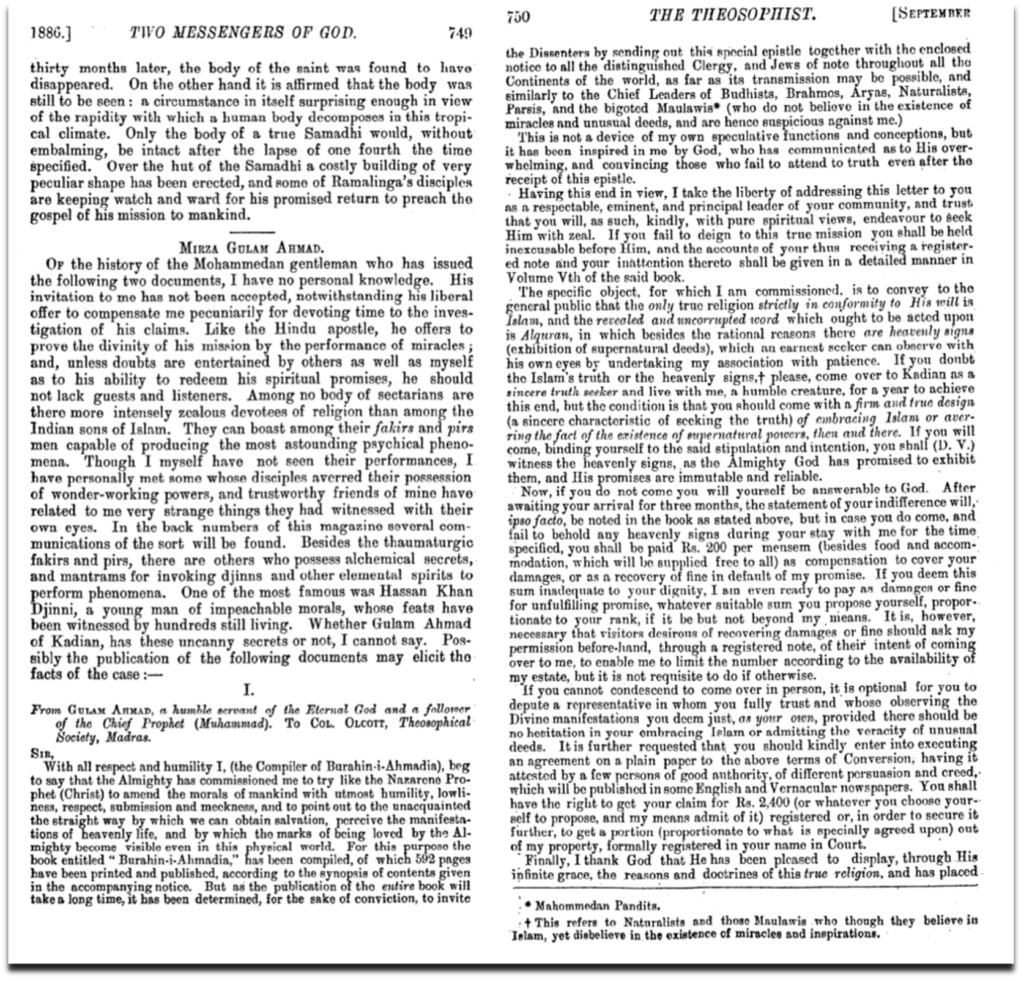
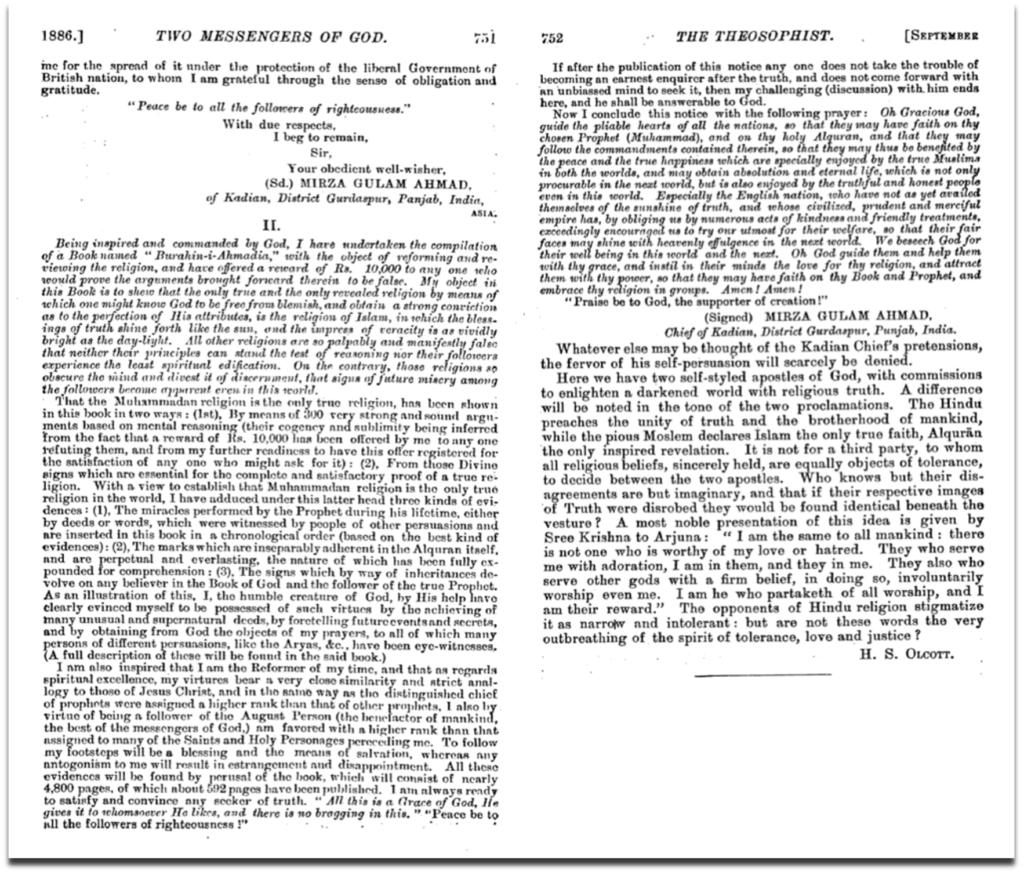
Olcott, however, indicated he could not to go to Qadian. Firstly, as a theosophist he fundamentally couldn’t accept that only one religion and one religious text contained true path to God. Secondly, he was unwilling to adhere to the condition that a sincere seeker after the truth who having observed heavenly sign would need to either embrace Islam or at least proclaim the existence of supernatural powers.
Brent D. Singleton talking about the second circular of the Promised Messiahas which was also printed by Olcott writes:
“In 1886, he came across an advertisement by Mirza Ghulam Ahmad of Qadian, India, founder of the Ahmadiyya Movement, challenging anyone to find fault with even a single one of his 300 arguments in favor of the authenticity of the Qur’an and Muhammad’s prophetic mission. Until this time Webb had given little attention to Islam, but now he was intrigued and wanted to learn more and thus started a correspondence with Ahmad.”[9]
Webb being an active theosophist and a keen reader at the time must have read about the invitation in the Theosophist. The mention of these circulars in Olcott’s journal paved the way for Webb to initiate correspondence with the Promised Messiahas.
Patrick D. Bowen in his book A History of Conversion to Islam in the United States, Volume 1 White American Muslims before 1975 mentions that:
The Theosophist society in the nineteenth century had not shown any significant interest in Islam although earlier editions discussed Arabs and Muslims. Olcott however could only claim brief knowledge of Islam and felt that he was not qualified to speak on it.[10] Bowen mentions Islamophilic figures such as Thomas M. Johnson, a prominent Platonist who became interested in Islam-connected metaphysical philosophy. Johnson with the encouragement of his friend Alexander Wilder, a Theosophist and eclectic physician, published selections from the twelfth-century Arab philosopher Ibn Badja’s The Proper Government of Life for the Individual and a new English version of Hayy Ibn Yaqzan the famous Sufi-inspired Islamic philosophical text in the first volume of the Platonist.[11]Johnson also started the first American Sufi organization, the ‘Sufic Circle’ and played a major role in encouraging the interest in Islam and Sufism in the Theosophical Community.[12]
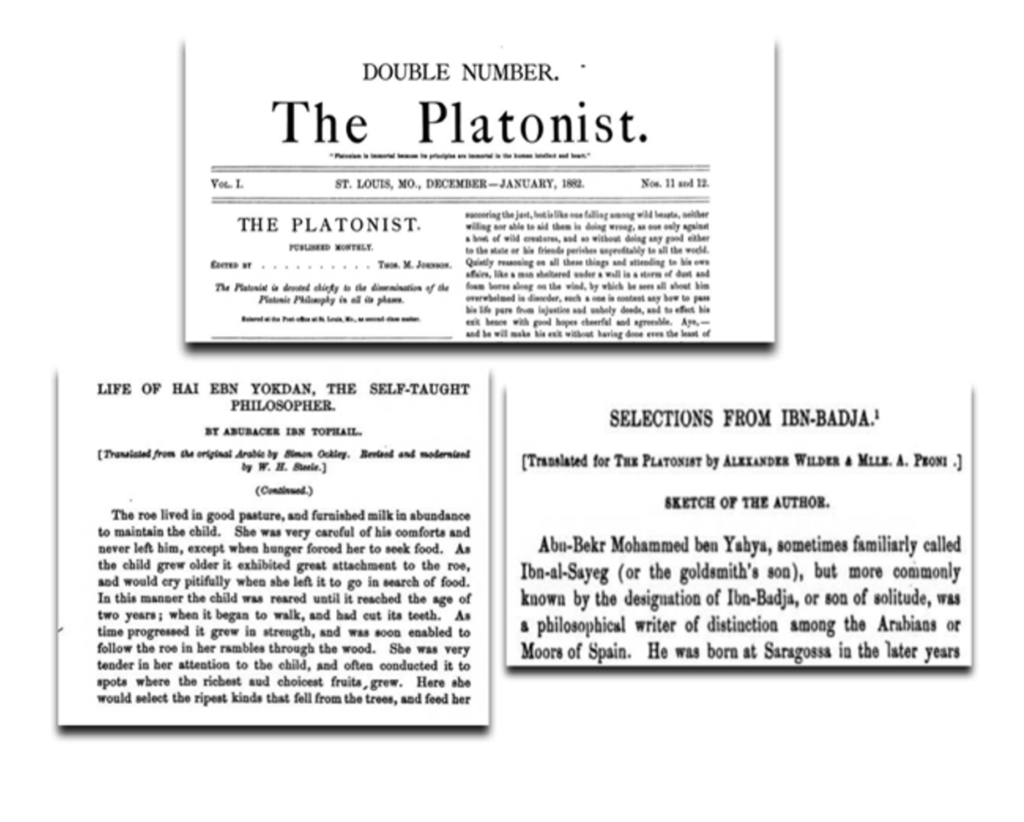
Bowen suggests that Webb a keen reader on Theosophy related writings while studying at the St Louis’s Theosophical Lodge which was highly influenced by Thomas M. Johnson must have come across these Islam related writings yet the Invitation of the Promised Messiahas that Webb had come across was “undoubtedly a major event in Webb’s religious life”[13]
According to Bowen one explanation of Islamophilic Theosophy in 1887 by Johnson is that he may have been influenced by the same material which had interested Webb’s journey to Islam i.e., the circulars of the Promised Messiahas published by Olcott in his journal. Bowen writes:
“Indeed, the timing of the appearance of information about Ghulam Ahmad in the ts [Theosophical Society] relative to Johnson’s increased interest in Islam and Sufism is quite suggestive. Learning about Ahmad’s activities may have, therefore, been what motivated Johnson to create in March 1887 his own Islam-connected practical occult organization, the ‘Sufic Circle.’”[14]
Webb’s correspondence with the Promised Messiahas
As mentioned above the Promised Messiah’s as invitation was sent to all major religious leaders.
The Promised Messiahas wrote:
“But as the publication of the entire book will take a long time, it has been determined, for the sake of conviction, to invite the Dissenters by sending out this special epistle together with the enclosed notice to all the distinguished Clergy, and Jews of note throughout all the Continents of the world, as far as its transmission may be possible, and similarly to the Chief Leaders of Budhists, Brahmos, Aryas, Naturalists, Parsis, and the bigoted Maulawis (who do not believe in the existence of miracles and unusual deeds, and are hence suspicious against me.) This is not a device of my own speculative functions and conceptions, but it has been inspired in me by God, who has communicated as to His overwhelming, and convincing those who fail to attend to truth even after the receipt of this epistle.”[15]
Alexander Russell Webb initiated the correspondence with the Promised Messiahas after discovering the invitation of the Promised Messiahas in Olcott’s journal The Theosophist or in a newspaper The Scotsman. This ismentioned in the Urdu synopsis of Webb’s first letter found in the writings of the Promised Messiahas [Shahna-e Haqq], (Scourge of the Truth). Webb had stated that he had seen the letter of the Promised Messiahas in an American Newspaper in which the Promised Messiahas had invited readers to a demonstration of the truth. This had inspired Webb to write to him. Webb also stated that he had made extensive study of Buddhism and Hinduism and had attempted to make a study of the teachings of Zoroaster and Confucius. He had, however, only been able to learn very little about Muhammadsa. Webb concluded that ‘‘He is sincerely in search of the truth.’[16]
Webb’s second letter received at Qadian confirms that he had received the reply to his first letter by the Promised Messiahas. Webb writes:
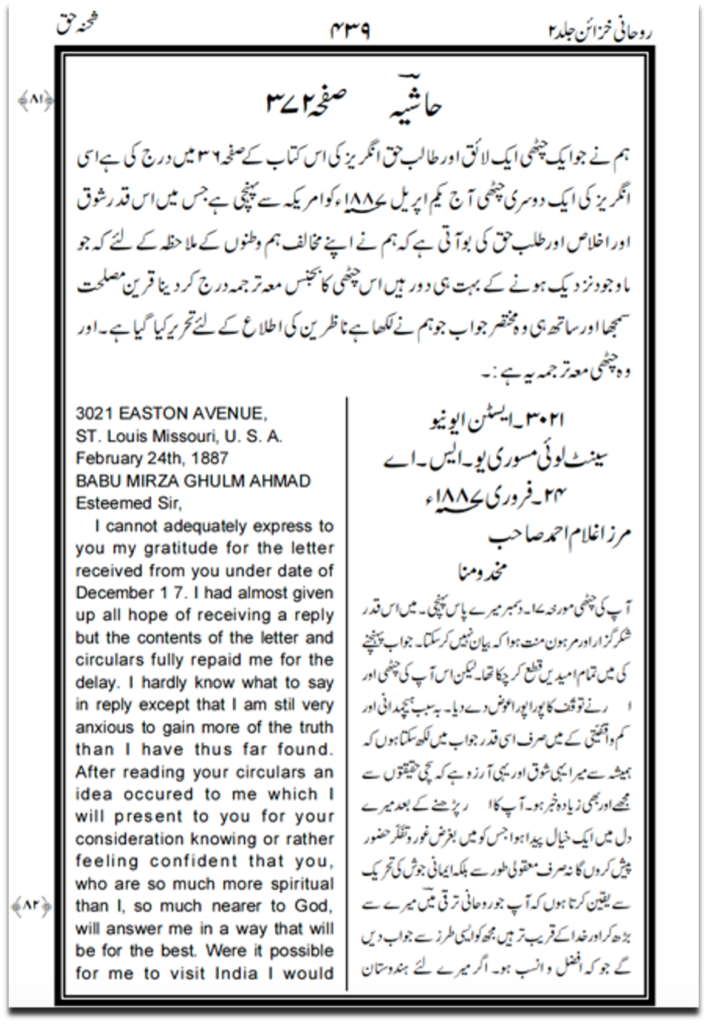
“I cannot adequately express to you my gratitude for the letter received from you under date of December 17. I had almost given up all hope of receiving a reply but the contents of the letter and circulars fully repaid me for the delay. I hardly know what to say in reply except that I am still very anxious to gain more of the truth than I have thus far found. After reading your circulars an idea occurred to me which I will present to you for your consideration knowing or rather feeling confident that you, who are so much more spiritual than I, so much nearer to God, will answer me in a way that will be for the best.”[17]
The Promised Messiahas has included the copy of Webb’s second letter with an Urdu translation and his reply to Mr Webb. Webb expresses that as a family man his current financial situation would not allow him to come to Qadian but if Islam is the only true religion then he is ready to present himself as its missionary in America. He writes:
“If, as you say, the Mohammedan is the only true religion, why could I not act as its apostle or promulgator in America? My opportunities for doing so seem to me very good, if I had someone to lead me aright at first. I have been led to believe that not only Mohammed but also Jesus, Gautama Buddha, Zoroaster and many others taught the truth, that we should, however, worship God and not men. If I could only know what Mohammed really taught that was superior to the teachings of others, I could then be in a position to defend and promulgate the Mohammedan religion above all others. But the little I do know of his teaching is not sufficient for me to do effective work.”[18]
He continues: “I have no reason to doubt that you are inspired by God to spread the light of truth therefore I would be happy to know more of your teachings and to hear further from you. God, who can read all hearts, knows that I am seeking for the truth that I am ready and eager to embrace it wherever I can find it. If you can lead me into its blessed light you will find me not only a willing pupil but an anxious one.”[19]
In response to Webb’s second letter The Promised Messiahas replied on 4th April 1887:
“I received your letter, dated 24th of February 1887, which proved itself to be great delight to my heart and a satisfaction to my anxieties. The contents of the letter not only increased my love towards you that led me to the hope of a partial realization of the object which I have in view for which I have dedicated the whole of my life viz, not to confine the spread of the light of truth to the oriental world but, as far as it lies in my power to further it in Europe, America, & Co. where the attention of the people has not been sufficiently attracted towards a proper understanding of the teachings of Islam.”[20]
Umar F. Abd-Allah in his book A Muslim in Victorian Britain the Life of Alexander Russell Webb talking of Webb’s correspondence with the Promised Messiahas writes:
“One of Webb’s first steps toward Islam, however, occurred in St. Louis and, insofar as we know, without direct connection to the Theosophical Society. Two years before his move to the Philippines, where he accepted Islam, Webb initiated a remarkable correspondence about Islam with the Indian Muslim scholar Mirza Ghulam Ahmad. Mirza Ahmad would soon become the object of great controversy, but that was not yet the case when Webb wrote him. At the time, Mirza Ahmad was recognized as one of the foremost Muslim scholars of India and was actively involved in making Islam known to the West, especially through personal correspondence with prominent Westerners. Webb came to know of Mirza Ghulam Ahmad’s interest in corresponding with persons interested in Islam and wrote a letter to him. The Webb–Mirza Ahmad letters are an essential part of Webb’s biography and are of great note because they were a prelude to Webb’s later correspondence with Indian Muslims and presaged many of his later concerns about Islam, even the possibility of creating an Islamic mission in America.”[21]
In 1887 Webb was appointed by President Cleveland to the post of Consular Representative of the United States at Manilla, the chief of the Philippine Islands. Webb accepted Islam in the Philippines a year later in 1888.[22] It was in Manila that Webb encountered a Muslim businessman from Bombay who had arranged a correspondence of Webb with Badruddin Abdullah Kur in India. Badruddin published some of their correspondence in Bombay newspapers. Haji Abdullah Arab a wealthy Memon merchant came across these letters and having heard about Islamic mission in England wrote a letter to Webb and after their correspondence decided to pay Webb a visit in Manila. A financial contract was in place for the Webb’s services which included $ 200 salary per month for the propagation of Islam in America and separate funds were agreed for formation and maintenance of a publication department. Haji Abdullah Arab upon return from Manila alongside Maulvi Hassan Ali, a prominent scholar at the time, [Both later accepted the Promised Messiahas] started collecting funds and arranging a visit of Webb to India. Haji Abdullah Arab informed Webb to resign from his post although it was not a wise decision as expressed by Maulvi Hassan Ali later.[23]
Webb however resigned from his post and decided to travel to India, he arrived in India in October 1892. He spent about four months in India touring and visiting Muslim leaders and delivering lectures. Three of those lectures that were delivered in Madras, Hyderabad and Bombay are published with the preface of Maulvi Hassan Ali.[24] The arrival of Webb in India happened to be at the time when the Promised Messiahas had announced his claim to be the second coming of Messiah in 1891 which prompted great uproar and hostility towards the Promised Messiahas in India.
It was Webb’s journey from Agra to Lahore where the possibility of meeting the Promised Messiahas in Qadian was raised. Maulvi Hassan Ali[25] published a book, Taeed-e-Haq (Corroboration of the Truth) in which he narrated the entire account of Webb’s visit to India.
He writes:
“I met Mr. Webb in Bombay and accompanied him on his tour of Poona, Hyderabad and Madras. In Hyderabad, Mr. Webb told me, “I am very grateful to Mirza Ghulam Ahmad. It is because of him that I have had the honor to join Islam. I would like to meet him.” I narrated to him the stories of his ill repute (i.e. his claim of being the Promised Messiah and Mahdi – author’s comment) that I had heard about him. Mr. Webb dictated a letter for Hazrat Mirza and received back an eight-page reply. Hazrat Mirza wrote to me to translate the letter word for word when reading it out to him. I did accordingly. Mr. Webb listened to the letter with rapt attention and respect. Hazrat Mirza had given detailed arguments in the letter about his claims, and had also mentioned about the opposition of the clerics of Punjab, and the insurrection among the common men. He had also written that he, too, was very desirous of meeting Mr. Webb. Mr. Webb, Haji Abdullah and I met together to decide the course of action. We concluded that it would not be prudent to meet with a maligned person like Hazrat Mirza at a time when we needed to collect donations. Such a meeting would hurt the work of propagating Islam. Now, I really regret this unfortunate decision. When Mr. Webb went to Lahore, he did not go to Qadian for this reason. Even more regretful was a reply given by Mr. Webb to a question put to him in Lahore. He was asked why he was not going to Qadian to visit Hazrat Mirza? His impertinent reply was “What is there in Qadian?” Some people relayed this rude remark to Hazrat Mirza.”[26]
Webb’s diary of his tour is filled with incidences and experiences which portrays mismanagement and incompetence on the part of those who took the responsibility for Webb’s arrival in India.[27] On one occasion a meeting with the Nizam [Muslim Leader] of Hyderabad was expected but “Webb quickly lost patience with the Nizam and his secretary, who was forever making vague promises for appointments.”[28] Webb also met various Muslim Nawabs, many of whom he disliked, because they had adopted western clothing forgetting the true value of their historical legacy. Webb also met a Muslim mystic who predicted a full success of his American mission and that he saw large numbers of Muslims in North America.[29]
It is quite unfortunate that someone who had just initiated his journey to Islam was presented with such a trial where he was told that meeting the Promised Messiahas would harm his Islamic endeavours in America. Upon his return to America the donations which were the reason why Webb could not meet with the Promised Messiahas soon came to a halt, Due to the internal dissention and lack of funds, his mission only lasted for a few years[30] Webb mistakenly thought that the propagation of Islam in America was dependent on the collection of funds alone. He had not realised that he had missed the biggest opportunity of his life by not meeting the very man whose advent was prophesised by the Holy Prophetsa 1400 years ago. He did not realise that for the success of this mission, the guidance and prayers of the reformer of the age were paramount.
Maulvi Hassan Ali Sahib who later accepted the Promised Messiahas continues and writes:
“I stayed with Mr. Webb for about two months. He is in reality a very decent person, and has developed a genuine fondness of Islam. As far as I could, I tried to increase his knowledge of Islam, dispelled some wrong ideas, and gave him instructions on some essential issues. I also gave him his Muslim name, Sheikh Muhammad. It happened just as I had said. The Muslims of India did promise donations, but the collections were few. Haji Abdullah Arab tried his utmost but with little success. The Muslims were ready to spend millions on un-Islamic pursuits but gave nothing for this important task. The only worthwhile collections were made in Rangoon and Hyderabad Deccan. I think the total amount that was sent to Mr. Webb was thirty thousand rupees, out of which Haji Abdullah Arab had contributed sixteen thousand rupees. Poor Haji was crushed in this undertaking. Steeped in anxiety from the non-receipt of promised donations, Haji Abdullah repaired to his spiritual mentor and apprised him of the problem. The Pir sahib[31] performed Istikhara, and was informed: “The propagation of Islam in the United States is taking place under the authority of Mirza Ghulam Ahmad. His prayer can set the work aright.” The next day, when Pir sahib gave this information to Haji Abdullah, he submitted to his mentor, “Sir, the learned religious scholars of Punjab and India have declared Mirza Ghulam Ahmad sahib to be an infidel, how can he be requested in this matter?” The Pir sahib was amazed to hear this and repaired once again to God, and performed Istikhara. This time he saw the Holy Prophet Muhammad in a dream who informed him that, “Mirza Ghulam Ahmad is my assistant in this era. Do as he tells you.” The next morning Pir sahib told his disciples: “I will go to Mirza sahib myself, and if he asks me to go to America, I will.” When Haji Abdullah Arab and the other disciples heard about Pir sahib’s vision, and his resolution to go to Qadian, they did not consider it appropriate for the Pir sahib to go to Qadian himself. They suggested that Pir sahib not inconvenience himself with going to Qadian, but instead depute someone to go to Hazrat Mirza sahib on his behalf. Accordingly, Pir sahib’s assistant Abdul Latif and Haji Abdullah Arab went to Qadian. They met with Hazrat Mirza and apprised him of all the facts. They requested his attention to the matter so that the work of propagating Islam in America may go ahead smoothly….I heard the foregoing narrative from Haji Abdullah Arab himself. As I have mentioned before, I consider Haji Abdullah to be a most excellent man of God. Hence, there is no reason to doubt his narration. Given the ill repute of Hazrat Mirza, and the reputable stature of the Jhandawala Pir, there is no motivation for Abdullah Arab to concoct a narration that can apparently only harm his spiritual mentor.”[32]
The Ahmadiyya records show that Haji Abdullah Arab along with Khalifa Abdul Lateef travelled to Qadian for this matter.[33] It is also reported that Abdullah Arab Sahib came to Qadian and paid allegiance to the Promised Messiahas and created such a bond of love with Hazrat Maulana Nooruddinra that they became spiritual father and son. Hazrat Mufti Sahibra became his spiritual brother. After having done baait he established a dispensary in Baghdad and during a debate he was arrested by Ottoman authorities and asked him to identify himself. He stated he was a Qadiani, that his father was Maulana Nooruddinra and his brother was Mufti Muhammad Sadiqra and that he owned an orchard in Qadian. When the Promised Messiahas was informed of his statement Huzur stated if a letter comes from the Ottomans to confirm his statement, make sure it is stated that the Orchard belongs to him so that he may be saved. He said we will grant him the Orchard. The spiritual bond is such that this Orchard in reality belongs to my followers.[34]
Before the arrival of Mr Webb to India, the Promised Messiahas saw in a vision that Mr Webb had come to India and was beating a drum. The interpretation was that he was occupied in futile endeavour which would not lead to anything and this is what actually transpired. Similarly, Al-Badar and Al-Hakam reported that a letter from Mr Webb was read out to the Promised Messiahas in which he expressed that, due to the enmity of the west, there are many hurdles and difficulties in spreading the message of Islam in America. The Promised Messiahas pointed towards the weakness of Webb and stated:
“If people are not convinced by Mr Webb and none have accepted Islam through him then he only has himself to blame. Huzur recited a Persian couplet the translation of which is “What arises from the heart will, of necessity, sit well with the heart.” The reality is that he does not possess attraction and magnetism required which is attained through complete spirituality. The way in which Webb has dealt with us illustrates his intention and level of spirituality. He didn’t give due consideration to our community and left India having said bad words [against us]. Even now he has not shown bravery he knows that by establishing a bond with us he would be in loss. [i.e. he would have to face opposition]. According to us Abdullah Quilliam is far better than him who has formed a Jammat (Community) of Muslims.”[35]
Mr Basharat Ahmad the author of Mujadid-e-Azam recalls his visit to Qadian in 1906. A recently received letter was submitted to the Promised Messiahas in which Mr Webb expressed deep regret and sorrow that he had come to India but had not visited the Promised Messiahas in order to please some people for donations, although it was through the Promised Messiahas that he had attained guidance.[36]
Hazrat Mufti Muhammad Sadiqra in Zikr-e-Habib also mentions two letters from his correspondence with Mr Webb. He writes that in accordance with the instruction of the Promised Messiahas I corresponded with Mr Webb. Mufti Sahib had written a long letter to Mr Webb in reply to his letter received on 18 Feb 1902 in Qadian. Mufti Sahib tells Mr Webb that he had made a huge mistake listening to the opponents of the Promised Messiahas who themselves did not fulfil their promises to you. He stated at the beginning of his mission the Promised Messiahas had very few followers but now by the Grace of God they exceed 50,000 in number. The Urdu weekly newspaper Al-Hakam and an English magazine [The Review of Religions] is also published from Qadian, the first issue of which has already been sent to him and the second issue is on its way to him, Mufti sahib advised him to prudently read the magazine. Mufti Sahib informed him of the recent death of Maulvi Hassan Ali who had accompanied Mr Webb during his travels in India and had stopped him from visiting the Promised Messiahas, he had accepted the Promised Messiahas. Mufti Sahib concludes that obedience and following of prophets in their lifetime despite the opposition of people requires a great sacrifice. He says should reply after pondering over these matters.[37]
Webb’s reply came on the 9th March 1902 in which he expressed that he could not imagine that Muslims themselves would oppose his efforts. He says that he had already told the Muslims that there will be great opposition from the Christians to halt this effort and that they should not pay attention to it. Yet as soon as the news reached India of Christian opposition, they all turned against me and forgot all their promises. He says now he has come to realise that their belief is only superficial, and they do not possess the light i.e. truth. Their hearts are void of faithfulness towards the Holy Prophetsa. He confirms the receipt of magazines which he says he has distributed among Muslims. He further expresses his happiness that Brother Hassan Ali had met the Promised Messiahas before his demise. He says he regrets not visiting Qadian at the time. He requests to present his salam to the Promised Messiahas and requests prayers for his success.[38]
In conclusion as we have seen Alexander Russell Webb widely considered as one of the first American White converts to Islam was introduced to the Islamic faith by the Promised Messiahas and he initiated the correspondence with the Promised Messiahas. We have also seen how Webb showed regret and remorse in not meeting the Promised Messiahas on his visit to India due to the misguidance of the opponents of the Promised Messiahas. The two individuals who organised Webb’s visit to India and played an active part in dissuading him from going to Qadian later themselves accepted the Promised Messiahas. Even after his return the correspondence continued with the companions of the Promised Messiahas and Mufti Sahib in particular had encouraged him to accept the Promised Messiahas. Webb in return sends his Salam to the Promised Messiahas asks him for prayers knowing his claim of being the Promised Reformer. From here we can see that Webb did not reject the Promised Messiahas rather in one of his earlier letters he wrote: “I have no reason to doubt that you are inspired by God to spread the light of truth”.[39]
[1] Yankee Muslim: The Asian Travels of Mohammed Alexander Russell Webb Edited by Brent D. Singleton P.12
[2] The Three Lectures of Mohammad Alexander Russell Webb Published by Moulvi Hassan Ali P.24
[3] Ibid P.24/ Yankee Muslim P.16-22
[4] The Three Lectures of Mohammad Alexander Russell Webb Published by Moulvi Hassan Ali P.24
[5] A Muslim in Victorian America: The Life of Alexander Russell Webb by Umar F. Abd-allah p.58
[6] Olmstead, History of Religion, 523
[7] The Theosophical Society: The History of a Spiritualist Movement by By Jeffrey D. Lavoie P.2-5
[8] Majmua Ishtiharat Vol 1 P.36-40/ The Theosophist September 1886 P.749-752
[9] Minarets in Dixie: Proposals to Introduce Islam in the American South by BRENT D. SINGLETON P.
[10] A History of Conversion to Islam in the United States, Volume 1 White American Muslims before 1975 by Patrick D. Bowen P.98
[11] A Monthly Periodical, Devoted Chiefly to the Dissemination of the Platonic Philosophy. The journal included translations of Plato and his Neoplatonic commentators, Greek, Persian and Arabic.
[12] Ibid p.19
[13] Ibid P.98-99
[14] Ibid P.103
[15] Majmua Ishtiharat Vol 1 No 30 P.30, (Edition 2019)/ The Theosophist Sep 1886 P.750
[16] Shahna-e Haqq Ruhanai Khazaen Vol 2 P.373
[17] Ibid P.439
[18] Ibid P.441
[19] Ibid P.441
[20] Shahna-e Haqq Ruhanai Khazaen Vol 2 P.443
[21] A Muslim in Victorian America, The Life of Alexander Russel Webb by Umar F. Abd-Allah P.60
[22] Ibid P.66
[23] The Great Reformer P.224
[24] The Three Lectures of Mohammad Alexander Russell Webb Published by Moulvi Hassan Ali.
[25] Maulvi Hassan Ali and Haji Abdullah Arab both later accepted the Promised Messiahas.
[26] Mujaddid Azam (The Great Reformer) P.224-225
[27] Ibid p.129-133
[28] A Muslim in Victorian America, The Life of Alexander Russel Webb by Umar F. Abd-Allah P.129
[29] Ibid 139,141
[30] Yankee Muslim: The Asian Travels of Mohammed Alexander Russell Webb P.40-46
[31] Pir Jhandeaala, Maktubat-e-Ahmad Vol 2 P.431 (New Edition)
[32] Mujaddid Azam (The Great Reformer) P.225
[33] Maktubat-e-Ahmad Vol 2 P.431 (New Edition)
[34] Register Rawayat Vol 15 Narration Sheikh Attaullah Sahib Ahmadi
[35] Al-Badar 14 March 1907/ Al-Hakam 10 March 1907
[36] Ibid P.227
[37] Zikr-e-Habib P.307-310
[38] Ibid P.310-312
[39] Shahna-e Haqq Ruhanai Khazaen Vol 2 P.441

Related Articles
‘A Warning to a Pretender to Divinity’
Revival of Faith: A Universal Search for a Reformer